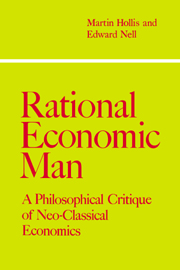Book contents
- Frontmatter
- Contents
- Preface
- Introduction
- 1 Relevance and falsification
- 2 Rational economic man
- 3 Theory and hypothesis
- 4 Facts and theories
- 5 Behaviour and prediction
- 6 A priori knowledge
- 7 Deductive explanation
- 8 The assumptions of neo-Classicism
- 9 Rationalist foundations for economic theory
- Bibliography
- Index
- Frontmatter
- Contents
- Preface
- Introduction
- 1 Relevance and falsification
- 2 Rational economic man
- 3 Theory and hypothesis
- 4 Facts and theories
- 5 Behaviour and prediction
- 6 A priori knowledge
- 7 Deductive explanation
- 8 The assumptions of neo-Classicism
- 9 Rationalist foundations for economic theory
- Bibliography
- Index
Summary
Truths of mathematics have been compared to the gelid peaks of distant mountains, which cause the climber a shiver of excitement. On the other hand they are often regarded as moves in a game, whose rules we invent and discard at will. Rationalists have more sympathy for the former view; empiricists for the latter. As we have already seen, empiricists cannot accept that a generalisation is projectible, only if deduced from a sound theory whose range of application is known. For this would imply that theory has its own truth, in the sense that the laws of, for instance, logic, number theory or the differential calculus are as much part of our knowledge of how things are as is the law of gravity. Empiricists are bound to reject any such view of theory on the ground that statements which are true a priori cannot also be synthetic. Rationalists disagree, arguing that there can be a priori knowledge of matters of fact and that this alone provides a coherent role for theory. In this chapter we shall look for chinks in the armour of Empiricism and, in the next, shall deploy a brand of Rationalism which we judge better accoutred. Of the various empiricisms, we shall discuss only Logical Positivism and Conceptual Pragmatism in any detail and so offer our apologies in advance to any others unjustly neglected.
The separation of the ‘a priori’ and matters of fact in Empiricism
If empiricists have a slogan, it is that ‘all knowledge comes from experience’. This seems at first evidently true.
- Type
- Chapter
- Information
- Rational Economic Man , pp. 140 - 169Publisher: Cambridge University PressPrint publication year: 1975



